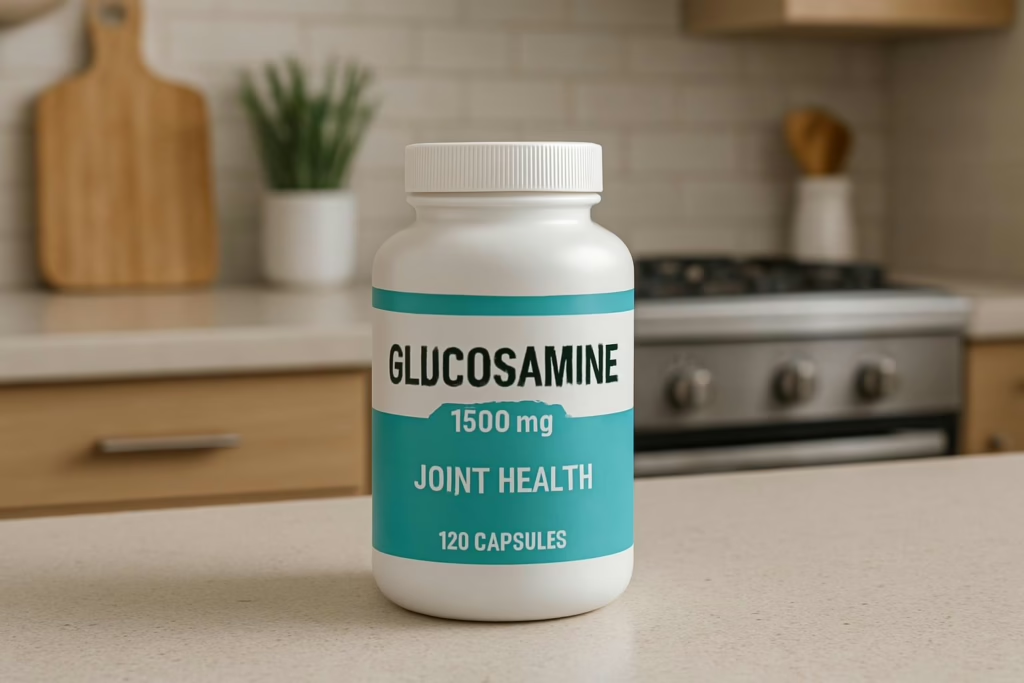
Do Glucosamine Supplements Support Muscle During Exercise
Glucosamine is one of the most popular supplements available to support our health and research shows that glucosamine may support muscle strength during exercise to improve exercise ability.
Glucosamine is abundant in the body as a part of cartilage connective tissue but many people do not consume rich dietary sources of this amino sugar. Because of this supplemental glucosamine is often recommended for people with joint issues. Our bodies are very tolerant to this amino sugar. The regular glucosamine supplement dose about 1500mg a day.
Glucosamine supplements are very popular with elite athletes who train their bodies to the maximum. These individuals experience a lot of stress to their joints from external counteractive forces during exercise. Because of this they may need to support their joints with supplements such as glucosamine. There is also gathering evidence that glucosamine supplements could support more optimal cardiovascular health and muscle strength or function during exercise.
Some rich food sources of glucosamine include liver and eggs. Many modern diets are deficient in glucosamine building blocks. This is because richer amounts of glucosamine and glucosamine building blocks are found in the less popularised cuts of meat. These cuts were a more substantial part of the diet of our ancestors which people just do not eat a lot of anymore. This is one of the reasons why glucosamine supplements are so popular as a dietary supportive food supplement.
Here the evidence that glucosamine supplements support muscle strength or functioning during exercise will be considered to show how glucosamine could support your overall wellbeing.

Glucosamine
Glucosamine is one of the most popular wellness supplements. This is possibly because of various studies which support the use of glucosamine supplements to assist with promoting optimal wellness of the joints. Our tolerance levels of this amino sugar are also very high with minimal reported adverse effects. Supplements of glucosamine are usually found in doses of up to 1500mg per day with no RDA set for this nutrient.
Glucosamine is a small amino sugar made from glucose and is found extensively throughout the body. Glucosamine is made naturally within our bodies from a sugar molecule and the amino group from the amino acid glutamine. Our connective tissues contain very dense amounts of glucosamine and the highest density of glucosamine is found in our cartilage. Glucosamine also contributes to the production of hyaluronic acid. This is also an important cushion for our joints and limbs during movement.
Studies estimate that 90% of consumed glucosamine is absorbed and rapidly integrated into cartilage. Connective tissues such as cartilage are important for ensuring smooth movements of our limbs during exercise and also for absorbing counter active forces from movement. Without proper connective tissues such as cartilage we would experience a lot of pain with movement and this is detrimental to exercise ability. This could also lead to losses in muscle strength or function during exercise.

Glucosamine And Muscle Exercise Ability
Various studies have shown that glucosamine supplements could have a positive effect on muscle function or strength during exercise and overall exercise ability.
One preclinical study found that a glucosamine supplement could support aerobic or running ability. Glucosamine supplementation supported motor coordination and also mitochondrial health to boost muscle function. Glucosamine has also been shown to be able to support the regular physical activities of older individuals within a household.
Our mitochondria are very important for sustaining muscle function because they are our sources of muscle energy. As a source of important rate limiting nutrients for athletes who wear their joints during intensive training glucosamine supplementation could ease mitochondrial stresses and inflammation. Glucosamine may also be supportive of some metabolic conditions caused by excessive oxidative stresses and inflammation. Studies support this and have shown that glucosamine supplementation supports mitochondrial energy production while also easing inflammation. Systemic inflammation in sufferers of osteoarthritis may be reduced by glucosamine supplementation as evidenced by significant reductions in joint pain. These are subtle but important ways in which glucosamine supplementation could support optimal athletic ability and overall muscle function during exercise.
Glucosamine And Our Circulatory System
Glucosamine supplements have also been shown to support blood vessel health by assisting with optimal endothelial function. Our circulatory system is very important during exercise because our blood vessels ensure that there is an adequate supply of nutrients to the muscles. This allows them to function correctly. Restriction or abnormalities in our circulation may cause muscle atrophy or wasting which reduces exercise capacity and muscle function through reductions in essential nutrients such as oxygen. Blood flow restriction is well known to increase susceptibility to fatigue.
Glucosamine could provide anti inflammatory protection against blood vessel atherosclerosis. This is linked to heart attacks and reductions in cardiovascular health. A study in support of this found that glucosamine supplements were preventative of the risk of developing cardiovascular disease. One study also found that glucosamine could support the recovery of the heart muscle following heart attacks resulting from vascular issues and suggested that glucosamine may be cardioprotective. They found glucosamine supplements could significantly improve heart muscle recovery as well as aspects of heart function. Glucosamine may promote resistance to stress or cell survival.
Other studies have found similar. There is evidence of an anti inflammatory nature to supplemental glucosamine on the circulatory system through reductions in inflammatory cytokines and stress tolerance. This supports the role of glucosamine as a means of supporting optimal muscle ability or function during exercise via promoting more optimal vascular health.

Glucosamine And Our Joints During Exercise
Some important influencing factors on muscle function or strength during exercise are things like joint health and bone density. These are essential in ensuring that our limbs are able to withstand external forces. Resistance to external stresses is important in aerobic activities such as running and powerlifting which may be damaging to the joints.
Glucosamine is a popular supplement used in support of joint health. Clinical trials show that glucosamine supplement programmes may be able to slow osteoarthritic knee disease progression. Many studies have found that 1500mg of glucosamine may promote knee function and the production of chondrocytes which help to heal joint tissues.
Glucosamine and the nutrients which form glucosamine within the body are rate limiting for cartilage connective tissue production in our joints. Cartilage is essential in promoting healthy joint movements. This is another reason why glucosamine supplements may influence our muscle ability or function during exercise.
A study showed that glucosamine supplementation could significantly influence knee strength or resistance during exercise. Bone density, muscle power and walking distance were also shown to be higher. Joint stiffness was shown to be lower in those who supplemented with glucosamine. As a result this study found that consistent glucosamine supplementation could influence muscle strength or function during exercise.
Other studies support this too. A similar study found that knee limb strength was also improved with glucosamine supplementation after 28 days. Glucosamine was shown to be able to influence muscle strength gain over 12 weeks. Another study also found improvements in muscle strength over 12 weeks of supplementation with glucosamine.
Overall the research indicates that glucosamine supplementation could positively influence muscle functioning or strength through supporting various aspects of our health including cardiovascular and joint health.

Summary
Research shows that glucosamine supplements may support muscle function or strength during exercise. Glucosamine is one of the most popular wellness supplements and is found in large amounts in connective tissues. This includes cartilage which is very important for ensuring the smooth movement of joints and resistance to external forces. Without proper cartilage we would experience a lot of pain with movement.
Very active people who run often or do powerlifting exercises require healthy cartilage and joints to support their bodies against counter active forces. This is why glucosamine supplements are also very popular with elite athletes. Glucosamine is rate limiting on the production of cartilage which supports athletic ability through resistance to external stresses from exercise. Once consumed most of the ingested glucosamine is very quickly integrated into joint tissue.
Various studies have shown that glucosamine supplements could have a positive effect on muscle functioning during exercise. Research shows that glucosamine could possibly support improvements in muscle strength after 12 weeks of glucosamine supplementation. One study found glucosamine supplementation could support motor coordination and also mitochondrial health to boost muscle function. Glucosamine has been found to be anti inflammatory which supports optimal metabolic health.
The anti inflammatory nature of glucosamine as a supplement could also be protective of our circulatory system and heart. This is very important for muscle ability and function as our blood supplies nutrients which the muscles use throughout exercise. Glucosamine supplementation has been shown to have possible cardioprotective effects and may also reduce atherosclerosis risk.
Overall the research suggests that glucosamine supplementation could positively influence muscle functioning or strength during exercise by supporting cardiovascular and joint health.
For more interesting articles see the main articles page.





